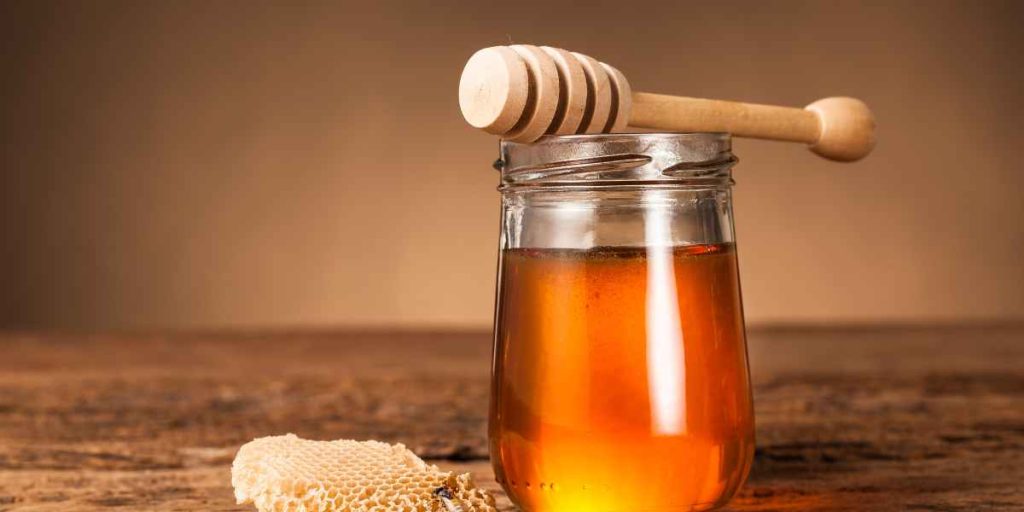The process of honey production
The production of honey involves a multistep process. In the first phase, worker bees collect nectar from various flowers and store it in a special gland in their bodies. They then regurgitate the collected nectar into the mouths of other worker bees. This process continues until the nectar is partially digested and transformed into honey. Once the nectar is partially digested, it is deposited into honeycomb cells and fanned with the bees’ wings to evaporate excess moisture, resulting in the thick, concentrated substance we know as honey.
Components of Honey
Honey is not merely a sweet substance; it’s a complex blend of various compounds that contribute to its multifaceted benefits. Besides its primary components of fructose and glucose, honey also contains minerals such as aluminum, boron, chromium, copper, lead, tin, zinc, and various organic acids like malic acid, citric acid, tartaric acid, and oxalic acid. It’s rich in vitamins, proteins, hormones, acetylcholine, antibiotics, phytonutrients, and enzymes. Additionally, honey contains about 19–21% water, along with other nutritive elements. Vitamins such as vitamin C (ascorbic acid), B vitamins (B1, B2, B3, B5, and B6), vitamin E, vitamin K, and provitamin A (carotenoids) are also present in varying amounts in honey.
Health Benefits of Honey

Anti-Inflammatory Properties
Honey’s anti-inflammatory properties are among its most notable benefits. Honey contains compounds like flavonoids and phenolic acids that help reduce inflammation in the body. These compounds neutralize free radicals and oxidative stress, contributing to the prevention of chronic diseases.
Wound Healing:
Honey has been used for centuries as a natural wound healer. Its antibacterial and antifungal properties aid in preventing infection and promoting wound healing. Honey’s viscosity creates a protective barrier that helps prevent bacteria from entering the wound.
Digestive Aid:
Honey can alleviate digestive issues and promote better digestion. It contains enzymes that aid in breaking down food, and its natural sugars, including dextrin, are easily absorbed and can provide quick energy. Consuming honey regularly can contribute to improved digestive health.
Energy Booster:
Honey is a natural source of glucose, a simple carbohydrate that is quickly absorbed by the body, providing an instant energy boost. This makes honey a popular choice for athletes and anyone in need of a quick energy source.
Immune System Support:
The antibacterial and antifungal properties of honey contribute to a strengthened immune system. Honey contains high-density antimicrobial agents that combat harmful microbes and support the body’s defenses against infections.
Skin Care:
Honey’s moisturizing and antioxidant properties make it a valuable ingredient in skincare products. Honey hydrates the skin and helps retain moisture, and its antimicrobial activity can aid in treating various skin conditions.
Sleep Aid:
Honey contains serotonin and melatonin precursors, promoting better sleep. Consuming honey before bedtime can help regulate sleep patterns and improve sleep quality.
Rich in antioxidants:
Honey is rich in antioxidants like flavonoids, phenolic acids, and enzymes, which combat free radicals and oxidative stress. Antioxidants play a crucial role in maintaining overall health and reducing the risk of chronic diseases.
Anti-Aging Benefits:
The high antioxidant content in honey contributes to maintaining youthful skin by protecting against premature aging caused by oxidative stress. Honey’s antioxidants support cellular repair and rejuvenation.
Strength and Vitality:
Regular consumption of honey is associated with increased vitality and strength. Its natural sugars provide sustained energy throughout the day, making it an excellent addition to your diet.
Honey is more than just a sweetener; it’s a gift from nature packed with diverse benefits. From its anti-inflammatory and wound-healing properties to its immune system support and energy-boosting capabilities, honey’s versatility extends to skincare and promoting overall well-being. Its use in traditional medicine across cultures further emphasizes its significance. However, it’s essential to note that while honey offers numerous health advantages, moderation is key due to its sugar content. Incorporating honey into your diet and skincare routine can contribute to a healthier and more vibrant life.





